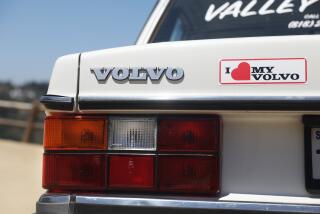China carmaker takes a big step with Volvo deal
- Share via
For a carmaker best known for its cheap compact vehicles, China’s Geely Automobiles has always operated with outsized ambitions.
Its plucky chairman, Li Shufu, named one of its models King Kong. He pledged to storm American and European markets even though his own brand has failed to crack the top 10 in China.
Last year the company unveiled a concept vehicle, a Rolls-Royce knock-off called the GE, which featured just one seat in the rear -- a massage chair, no less.
But despite Geely’s big aspirations, analysts reacted with a mixture of skepticism and surprise when the firm last year bid to buy Sweden’s Volvo Cars from Ford Motor Co. Geely is a company, after all, whose leading foreign markets include Venezuela, Iran and Algeria. Even Li described the courtship of Volvo as being “like a poor country boy chasing a top international celebrity.”
But after a signing ceremony Sunday at Volvo headquarters in Sweden to complete the $1.8-billion deal, which is slated to close later this year pending regulatory approval, Geely now stands in the forefront in China’s quest to become an international automotive player.
The acquisition provides Geely a well-known name in Volvo, along with a product team famed for its safety know-how. That’s no small detail for a carmaker that showcased a sedan in Detroit four years ago that failed to pass U.S. road standards.
Geely, which means “good luck” in Chinese, will get instant distribution in leading Western nations. And Volvo gives Geely a brand with which to compete in China’s lucrative luxury-car market, which is expected to double by 2015.
China last year surpassed the U.S. as the world’s largest auto market, with 13.6 million vehicles sold.
Michael Dunne, an independent auto analyst, said the deal comes at a time when Geely needed to raise its game. “There’s two ways of doing that,” Dunne said. “One is to methodically improve quality . . . like Toyota and Honda did in the 1960s and ‘70s, or shortcut the process by buying a global brand. Geely decided that, overnight, it would be a maker of low-cost vehicles with a gem in their portfolio to help them tap into markets that would have taken years and years to develop.”
Success is far from certain. Volvo was a money-losing operation for Ford, and analysts wonder how Geely will turn the company’s fortunes around.
One strategy would be to shift some production to China to reduce labor and overhead costs. But analysts said American and European customers might resist Volvos made in China. Geely is also likely to need some technical assistance from Ford, which bought Volvo in 1999.
But it’s uncertain what role the Dearborn, Mich., automaker will play in the transition or for how long.
“What Geely brings to the table is unclear,” said John Bonnell, a senior analyst for J.D. Power Asia Pacific. “A lot will depend on the interaction and relationship with Ford and what happens with R&D for the next models.”
Boni Sa, an analyst for CSM Worldwide, said Geely should allow Volvo to operate largely independently or risk weakening the Swedish company’s image.
Geely cars are priced from $6,000 to $16,000. The Volvo S80, by comparison, costs up to $100,000 in China.
“They will have to treat Volvo very carefully,” Sa said. “Chinese consumers still see Chinese-made cars as low-cost vehicles. It’s Geely that needs Volvo to upgrade its brand.”
Another concern is Volvo’s ability to compete against more-established foreign luxury brands such as BMW, Mercedes-Benz and Audi.
These premium cars have a large following among China’s rich -- many of whom are first-generation drivers and may regard Volvo as a family car lacking sex appeal.
“In the last several years, Chinese buyers of luxury cars have been ostentatious,” Dunne said.
“They want cars that say, ‘Do you know who I am?’ Maybe the second round of buyers will want a more subtle image.”
Foreign brands and their Chinese joint ventures dominate sales in China’s fragmented industry.
Leading the pack is Volkswagen, followed by Toyota, Hyundai, Honda and Nissan.
Geely, which includes Goldman Sachs among its list of investors, is tied for 12th place in market share at 2.6%.
It trails two other Chinese producers, BYD (5.1%) and Chery (4.8%), according to J.D. Power & Associates.
Analysts remain optimistic about Geely’s chances, if for no other reason than the determination of the company’s chairman.
Li’s legendary rise from the son of a farmer to head of Geely is oft repeated in the Chinese media. He got his start building refrigerators, weathered a real estate collapse on the tropical island of Hainan and parlayed his capital into motorcycles, then cars.
He is the 13th-richest person in China, with a net worth of $1.8 billion, according to Forbes magazine.
Nicknamed the “car maniac,” Li, 46, is known for his boundless energy and his frugality. He once took off his shoes during a state television interview to explain how cheap the pair were and that he was too busy to polish them.
In typical wry fashion, he once explained that a car was nothing more than “four wheels, one body, an engine, plus a sofa.”
Nicole Liu and Tommy Yang in The Times’ Beijing bureau contributed to this report.






